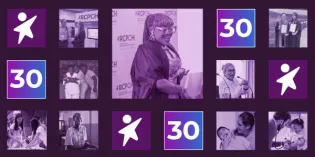This page is for those exploring, applying to or already in this sub-specialty training programme! We have insights from current specialists on what it's like working in paediatric rheumatology, opportunities to try out the sub-specialty and links to the relevant groups and other contacts.
Each sub-specialty has its own syllabus as part of Progress+ which you can download from this page, plus get details of the College Specialty Advisory Committee (CSAC) managing this sub-specialty.
- 1. What makes a paediatric rheumatologist?
- 2. A day in the life of a paediatric rheumatologist
- 3. How and where to experience paediatric rheumatology in your early medical career
- 4. Applying to a paediatric rheumatology programme
- 5. Information for paediatric rheumatology trainees
- External links
- Downloads
1. What makes a paediatric rheumatologist?
Paediatric rheumatologists relies on history-taking, examination and communication with other professionals, as the conditions they manage often do not have specific diagnostic tests. Central to their work is liaising with the multidisciplinary team (MDT) – particularly, specialist nurses, physiotherapists, occupational therapists and psychologists. They support collaborative work within clinical networks, are competent in practical skills such as joint injections and have expert understanding of the drugs used to target the inflammatory pathway.
Paediatric rheumatologists belong to a rapidly developing specialty that encourages a range of clinical and academic interests, including clinical, educational and basic science research. They are committed to contributing to collaborative research studies and clinical trials, with the aim of improving outcomes for children and young people with rheumatological conditions.
2. A day in the life of a paediatric rheumatologist
Much of our work is outpatient based and therefore time will often be spent in an outpatient clinic, or seeing patients on a day unit when they attend for their medication infusions. We enjoy manging chronic disease and patients are often under our care for many years. Clinical work is often done within networks where we liaise with other hospitals to provide care for patients closer to their home.
Inpatients are often complex and require careful review and collaboration with other specialties such as general paediatrics, immunology and infectious disease, respiratory renal and PICU.
As well as clinical work a typical day involves tasks such as reviewing results, prescribing, and helping to answer patient queries that come through to the team. Clinical research, quality improvement and teaching are integral to the specialty.
Multidisciplinary (MDT) working is key and a typical day will involve liaising with members of the team about patient care. MDT meetings are an opportunity to discuss patients, ensuring they are receiving holistic care.
As a consultant on call work will consist of telephone advice out of hours, rather than resident on calls. This means that it is possible to achieve a good work life balance, with regular working days and hours.
3. How and where to experience paediatric rheumatology in your early medical career
Below are some suggestions of ways to gain experience in paediatric rheumatology:
- A specific placement in paediatric rheumatology.
- Attending tertiary rheumatology clinics (contact nearest paediatric rheumatology team).
- Attend paediatric rheumatology outreach clinics with the tertiary hospital.
If specific paediatric rheumatology experience isn’t possible consider:
- A placement in adult rheumatology.
- Attending adult rheumatology clinics (especially young adult or transition clinics).
- Shadowing with paediatric physio team to learn musculoskeletal examination skills.
- Shadow a nurse specialist in a specialty that deals with chronic disease.
- Talking to patients/families with chronic disease to find out about some of their challenges.
As well as direct clinical experience you can:
- Attend local / national paediatric rheumatology teaching days.
- Attend conferences such as the British Society for Rheumatology (BSR) annual conference or case-based conference, paediatric rheumatology European association (PRES) congress.
- Consider joining the BSR and gain access to teaching, and webinars.
- Join the paediatric rheumatology trainees mailing list and attend monthly online teaching (email: paediatricrheumatologytrainees@gmail.com).
- Contact the paediatric rheumatology trainees education email to receive trainee-led education updates and resources: paedsrheumedu@gmail.com.
4. Applying to a paediatric rheumatology programme
Specific paediatric rheumatology experience is not necessary to apply for a sub-specialty training. The types of skills that assessors will look for are excellent team working, communication with patients, families and colleagues, patient centred care, history taking and examination skills, technical skills that would translate well to joint injections, research experience, critical appraisal skills, and an interest in education. Assessors will be looking for enthusiastic candidates who understand the skills needed to be a paediatric rheumatologist and can demonstrate an understanding of and commitment to the specialty.
5. Information for paediatric rheumatology trainees
CSAC members can be contacted for advice about gaining experience and training queries. Paediatric rheumatology is a small specialty and there are 14 tertiary centres across the UK. It can be difficult to predict where/ when tertiary rheumatology posts will become available.
This does mean that on occasion a tertiary consultant post may not be available immediately on finishing training. However, there is a commitment by CSAC to support trainees in finding suitable career opportunities at the end of training.
The Rheumatology CSAC have put together an Educational supervision guidance document to help their sub-specialty trainees as they enter the training programme, and for supervisors to support their trainees. This can be found below in the Downloads section. This explains how Rheumatology training will work, sources of support, ePortfolio requirements and educational opportunities.
External links
To find out more about paediatric rheumatology, the CSAC recommend the following websites as useful resources:







